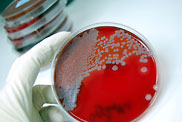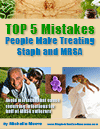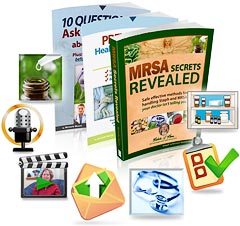what to do if youre a strep carrier
MRSA Carrier: Questions and Answers
What is a carrier? Can I ever become rid of MRSA? Will I e'er exist a carrier of MRSA?

Staph and MRSA bacteria normally alive in the olfactory organ of carriers.
MRSA is a growing problem across the world, often causing painful skin boils and abscesses, only also internal infections like pneumonia. Everyone is exposed to these contagious bacteria more than oft than they realize, simply however not everyone who is exposed gets infected.
For some, MRSA but lives within their nose and on their skin and information technology doesn't cause whatever symptoms or infection. These people are called "MRSA carriers". Carriers may never become infected. Yet, carriers can spread MRSA to other people who may become infected.
Continue reading for normally asked questions, plus facts nearly this disease fifty-fifty most doctors don't know.
MRSA and Staph carriers: Symptoms, infection transfer, testing and more
Some people are a Staph infection carrier. MRSA is an antibiotic resistant type of Staph bacteria. Staph is typically easier to care for equally it causes a less dangerous infection.

What is a carrier? Carriers have living MRSA leaner on or inside their bodies. Roughly 30% of people carry Staph bacteria (and an estimated 1-5% bear MRSA) on their peel and/or inside their olfactory organ or pharynx and don't even know it. They may never get infected and oftentimes have no thought they carry it. These people are called "carriers".
Your medico may have said you are "colonized" with the bacteria. MRSA colonization is the aforementioned as being a carrier. People who harbor MRSA can spread or transmit the bacteria to others. It's possible for them to spread it to someone else who then becomes infected.
If You are a carrier, will yous get an infection? Not necessarily. Only considering you conduct the bacteria on your skin or in your nose, it does not mean you will get infected. However, your adventure of becoming infected is greater if you are a carrier than those who are not. At that place are many risk factors that can increase your chances of an infection, such as puncturing your skin or having surgery, simply it does not guarantee you will become infected. Some factors that increase your gamble of infection include your age, medical conditions (like diabetes), stress, amount and route of exposure, a history of infections, and a weakened immune system.
If you are a carrier, do you have an increased chance of getting MRSA? Yeah. According to a study published in Clinical Infectious Diseases1, beingness a MRSA carrier increases your take chances of both infection and expiry. They found that almost 25% of people who carried MRSA for more than one year developed infections. 84% of subsequent infections required hospitalization and a few infections resulted in expiry. The study authors warned this data may not be representative of carriers in full general since they were studying medical middle patients. Some other written report shows that people who are persistent carriers have increased chances for infection and death2.
Considering some MRSA infections tin be very dangerous, and some people are at greater gamble (elderly, young, and immune compromised) a lot of emphasis is placed upon decolonization procedures, or ways to remove the bacteria from your body. Read on below for prevention and treatment methods.
If Yous're a carrier, can yous infect someone else? Yes, you tin spread the bacteria to other people, and those people can become infected. However, they may non become infected, and they may non behave the bacteria. As mentioned above, many risk factors come into play besides exposure to the leaner alone.
Medical professionals often downplay the risks of being a carrier or being around carriers. However, carriers of MRSA tin spread the disease to others. And MRSA carriers have been documented to spread the bacteria into the air. A Leeds University study3 highlighted the potential take chances of catching MRSA in a hospital. This 2001 study highlighted that people who were either infected or who were simply colonized can spread the bacteria into the air, creating a risk for others around them.

Only a test can tell if yous carry the bacteria or not.
How practise yous know if you lot carry MRSA? The standard testing method is a bacterial culture test of the nose. This means the inside of the nose is swabbed, and the lab determines if MRSA is present. If a person carries the disease, the olfactory organ is one of the most common places to notice the leaner. A positive nose civilization exam ways that you lot carry the bacteria. However, if your olfactory organ civilisation test is negative, you may however be a carrier.
This is because carriers can accept the bacteria living in other parts of their bodies and still test negative at their noses. Some doctors believe that the back of the pharynx is a more accurate identify to examination. The bacteria prefer places that are warm and moist, including the nose, throat, armpits and the groin surface area. In fact, some doctors will also test the pharynx and groin area in addition to the olfactory organ.
What are the symptoms of existence a MRSA carrier? Carriers who are not infected do not have infection symptoms.
Signs of infection tin include an infection that looks like a problems or spider bite, peel bumps, pimples, boils and abscesses. Internal infections are more than commonly seen with infirmary visits and tin can be pneumonia, septicemia or catheter infections. Click here for symptoms to picket for.
How do y'all become a carrier? What are the risk factors? You can easily selection up the bacteria by being close to infected people, which is virtually common in hospitals, nursing homes and in other healthcare facilities. Family members tin can besides become carriers (or go infected) past caring for their children or parents who are infected.
MRSA bacteria are commonly transferred from surfaces and objects that are contaminated with the bacteria (similar phones, door knobs, toys, etc) to your pare. You can also become a carrier later on having an infection. It tin also pass through the air on dust and other particulates.
MRSA decolonization and treatments for carriers
Free Report
Find "The Top 5 Mistakes" that waste material your fourth dimension and delay your recovery.

Enter your proper noun and e-mail beneath to get your report and our MRSA Staph newsletter.
Michelle is committed to protecting your privacy. She will NEVER rent, sell, or misuse your data.
Run across our PRIVACY POLICY
Will you always be a carrier? Possibly. Many people have stopped carrying the bacteria. People who were both infected and carried the bacteria take since tested negative on their nose cultures for the bacteria. Michelle Moore has seen this happen for people using either antibiotics or natural handling methods.
However, MRSA and Staph can be very difficult to get rid of. A powerful factor is that these bacteria can create biofilm colonies and Fifty-grade "stealth bacteria" to hide and protect themselves within your body. Many antibiotics do not piece of work against these stealth bacteria and that'southward where non-antibody approaches come in. Many people take institute taking maintenance levels of natural antimicrobial agents like oregano essential oils and olive leaf herbal supplements to exist very helpful. Products that break down biofilm layers in the torso tin be benign and can also help your antibiotics to work better, such equally Manuka dear. Strengthening your immune system is also an of import cistron.
How tin you decolonize from MRSA? Current conventional MRSA decolonization strategies include using the antibiotic cream mupirocin and swabbing inside the olfactory organ with it. Antibacterial torso washing using chlorhexidine soap is also recommended and sometimes oral antibiotics are used. A study published in the Infection Control and Hospital Epidemiology Journal4 concluded a successful decolonization protocol using a treatment consisting of: mupirocin nasal antibiotic, chlorhexidine mouthwash and a daily body launder using chlorhexidine soap. Intestinal, urinary and vaginal colonization, if present, was also treated at the same time and oral antibiotics were added if this treatment regimen failed.
Antibiotics have the side effect of killing the good bacteria that help to protect and support your health. Because of this and other side furnishings, Michelle favors methods that work with the body and minimize antibiotic side effects. She has seen complementary treatments, such as swabbing the nose using essential oils, and supporting the immune organisation help people clear MRSA bacteria from their nose. A simple solution may besides exist provided by Vitamin D. A report in the Scandinavian Journal of Communicable diseasesfive showed an increased gamble of MRSA nasal colonization with low vitamin D levels. Vitamin D works in many means to support your amnesty, one of which is helping the skin create antibacterial agents. Most people are very deficient in this important immune supporting vitamin.
Can you totally remove MRSA from your torso? Michelle has heard that many people no longer examination positive after having been infected. Still, she does not believe that a "total elimination" mind set is always appropriate. Such a mind gear up can pb to a paranoia of sorts. And a person may be exposed again to the disease in the customs or in a healthcare setting.
A better goal is to restore balance to the protective bacteria within your gut and on your skin and restore the health of your body'due south natural defenses. Because of the superbug leaner present everywhere today, it'southward of import to brand your torso more resistant to these bacteria. Resisting infection can be much easier if your immune system is strong and your body is in balance.
A holistic approach to protecting against infections

Working with your body and your immune system tin make information technology naturally more than resistant to infections
The best way to guard confronting infection is to employ a multi-front arroyo. While good hand and torso hygiene, using treatments that work, and cleaning your dwelling house are all important, those who brand their body naturally resistant to infections see the best results.
If you are a carrier or if you lot have an active infection, learn how to use treatments that support your body without violent it downwards. If you've been infected in the past, then boosting and maintaining your natural resistance is one of the virtually effective things you tin can do. You can learn about the most of import steps to finish MRSA hither.

Protect yourself and your family
MRSA and Staph are serious and potentially life-threatening infections. Antibiotics and conventional medicine often neglect against these superbugs. Fortunately, there are powerful natural and culling remedies for treatment these infections.
The MRSA Secrets Revealed Programme contains Michelle'due south 3-Step Infection-Free Method™, a complete how-to guide to naturally stop these infections. Information technology includes the strongest remedies for skin, internal, olfactory organ and other types of infection. The program as well includes ways y'all tin protect yourself and your family in hospitals and in the community.
Go started now by clicking the push beneath.

References:
1. Clin Infect Dis. 2008 Jul fifteen;47(2):176-81. Take chances of infection and death due to methicillin-resistant Staphylococcus aureus in long-term carriers. Datta R, Huang SS. http://www.ncbi.nlm.nih.gov/pubmed/18532892
2. PLoS One. 2013;viii(1):e53674. Epub 2013 Jan x. MRSA nasal carriage patterns and the subsequent risk of conversion betwixt patterns, infection, and expiry. Gupta M, Martinello RA, Young M, Strymish J, Cho K, Lawler Eastward. http://world wide web.ncbi.nlm.nih.gov/pubmed/23326483
three. Significance of Airborne Transmission of Methicillin-Resistant Staphylococcus aureus in an Otolaryngology–Head and Neck Surgery Unit; Teruo Shiomori, Doctor, PhD; Hiroshi Miyamoto, Physician, PhD; Kazumi Makishima, Doctor, PhD; Arch Otolaryngol Head Neck Surg. 2001;127(half-dozen):644-648. http://archotol.jamanetwork.com/article.aspx?articleid=482358
4. Infect Control Hosp Epidemiol. 2008 Jun;29(6):510-6. Highly effective regimen for decolonization of methicillin-resistant Staphylococcus aureus carriers. Buehlmann M, Frei R, Fenner L, Dangel K, Fluckiger U, Widmer AF. http://www.ncbi.nlm.nih.gov/pubmed/18510460
5. Scand J Infect Dis. 2010 Jul;42(vi-7):455-sixty. Vitamin D and methicillin-resistant Staphylococcus aureus nasal railroad vehicle. Matheson EM, Mainous AG tertiary, Hueston WJ, Diaz VA, Everett CJ. http://www.ncbi.nlm.nih.gov/pubmed/20210515
*Photo credits ©iStockPhoto.com/Linde1, © Fotolia/Yuri Arcurs
Source: https://www.staph-infection-resources.com/info/carrier/
0 Response to "what to do if youre a strep carrier"
Post a Comment